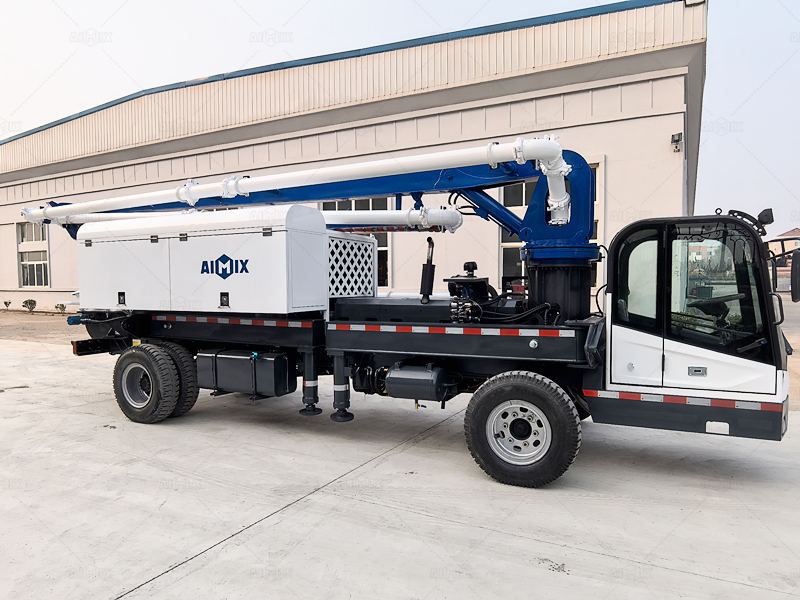How Economic Trends Are Affecting Concrete Mixing Plant Prices
- aimixglobal5
- Mar 16, 2025
- 4 min read
The concrete mixing plant industry plays a vital role in global construction, providing high-quality concrete for infrastructure, commercial, and residential projects. However, economic trends significantly impact the concrete mixing plant price, including both stationary and mobile batching plant prices. Fluctuations in raw material costs, labor shortages, inflation, and global supply chain disruptions all contribute to price variations.
For businesses looking to invest in a mobile concrete batching plant South Africa, understanding these trends can help make cost-effective decisions and optimize operations. In this article, we will analyze how economic factors influence pricing and what buyers should consider before purchasing.

Key Economic Trends Impacting Concrete Mixing Plant Prices
1. Rising Raw Material Costs
Raw materials like cement, steel, aggregates, and sand are essential for manufacturing concrete batching plants. However, their prices fluctuate due to:
Global supply chain disruptions (e.g., COVID-19, trade restrictions)
Increased demand for infrastructure projects in developing regions
Geopolitical instability affecting cement and steel exports
For example, the cost of steel, a major component in batching plants, has surged in recent years due to supply shortages. This increase has led to higher production costs, pushing up mobile batching plant price across different markets, including South Africa.
2. Inflation and Currency Exchange Rates
Inflation directly affects concrete mixing plant prices, especially in countries where manufacturing costs are linked to fluctuating currency values. As inflation increases:
Manufacturing costs rise (higher wages, transportation, and utilities)
Import-dependent regions see price hikes due to weaker currency exchange rates
Purchasing power decreases, making capital investments more expensive
For instance, in South Africa, fluctuations in the rand (ZAR) against the US dollar (USD) impact the price of imported batching plants. A weaker rand means higher costs for purchasing equipment from international concrete batching plant manufacturers.
3. Supply Chain Disruptions and Logistics Costs
The global supply chain crisis, caused by port congestion, transportation delays, and increased fuel prices, has made it more expensive to manufacture and deliver concrete mixing plants.
Shipping costs for large machinery have doubled in some cases
Delays in component sourcing lead to increased production time
Higher fuel prices impact the transportation of mobile batching plants
For buyers in South Africa, import costs for a mobile concrete batching plant South Africa have risen due to expensive freight charges. These supply chain issues have made locally manufactured batching plants a more attractive option.
4. Government Policies and Infrastructure Spending
Government investments in infrastructure projects significantly affect concrete mixing plant prices by influencing demand.
High demand for concrete in large projects increases prices due to supplier competition
Tax incentives for local manufacturing may reduce costs
Stricter environmental regulations can lead to price hikes due to compliance costs
For instance, South Africa’s commitment to infrastructure development in roads, bridges, and housing projects has increased the demand for mobile concrete batching plants South Africa, impacting pricing trends.
5. Shift Toward Sustainable and Mobile Solutions
With an increased focus on eco-friendly construction, many manufacturers are integrating energy-efficient technologies into their concrete batching plants.
Solar-powered batching plants reduce operational costs but have higher upfront prices
Recycling technology for aggregates increases plant efficiency but adds to the overall cost
Mobile batching plants are gaining popularity due to their flexibility and cost savings
As demand grows for mobile concrete batching plant South Africa, prices fluctuate depending on features like automation level, production capacity, and fuel efficiency.

Mobile Batching Plant Price Trends in 2025
The cost of a mobile batching plant varies based on capacity, brand, and region. Here’s an estimate of mobile batching plant prices:
Plant Type | Capacity (m³/h) | Price Range (USD) |
Small Mobile Plant | 25-50 | $30,000 - $70,000 |
Medium Mobile Plant | 60-90 | $70,000 - $150,000 |
Large Mobile Plant | 100+ | $150,000 - $300,000 |
In South Africa, buyers should also consider import duties, transportation costs, and after-sales support when calculating the total cost of ownership.
How to Mitigate Rising Costs When Buying a Concrete Mixing Plant
To minimize expenses and get the best deal on a mobile batching plant, consider the following strategies:
1. Compare Local vs. Imported Suppliers
Local suppliers may offer better pricing due to reduced import costs
Imported plants might provide advanced technology but at higher transportation expenses
2. Consider Second-Hand or Refurbished Equipment
Some manufacturers offer certified used batching plants at lower prices
Verify the condition and performance before purchase
3. Opt for Energy-Efficient Models
Although eco-friendly plants have higher upfront costs, they save money in the long run
Look for solar-powered or fuel-efficient batching plants
4. Lease Instead of Buying
Some companies offer leasing options to reduce the initial investment
Leasing allows flexibility for short-term projects
5. Choose Modular and Expandable Solutions
Modular batching plants can be expanded as needed, reducing initial investment costs
This approach is ideal for businesses planning long-term growth

Conclusion
The concrete mixing plant price is influenced by global economic trends, including raw material costs, inflation, supply chain disruptions, and government policies. For businesses in South Africa, the cost of a mobile concrete batching plant South Africa is affected by local currency fluctuations and shipping costs.
To navigate rising prices, buyers should compare mobile batching plant prices, consider energy-efficient options, and explore leasing alternatives. By staying informed about market trends and choosing reliable suppliers, businesses can make cost-effective investments in concrete production.




Comments